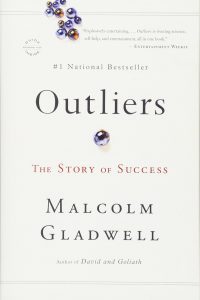
Malcolm Gladwell challenges the stereotypical rags to riches story of success. He makes his case using examples varying from successful sportsmen and technology leaders.
The book aims to demonstrate how the nuances of other variables such as generation, culture, family etc matter. Passion and hard work are essential to success, but they don’t reveal everything.
1.Opportunity:
- Gladwell argues that success is hardly found in the belief of rags to riches.
- When talent is identified, the door to opportunity is opened up to that person. Not to anyone else without talent.
- This allows the talented person access to resources like time and equipment to expand their skills.
- This amplifies the difference between those with opportunity and those without.
2 – 10,000 hours:
- Gladwell points out an intriguing observation citing a study. This spans several different fields from computing, business, sport and music.
- There appears to be a magical number of 10,000. This was the number of hours of work or practice that was put in by very successful people in their distinctive field.
- It can be said that it’s how much an individual practices and not how much innate talent they possess.
3 – Timing:
- Another variable that Gladwell presents is timing. Where, and which year you were born can also influence your opportunity.
- For instance, the list of the richest people in history reveals that 14/75 are American’s born in the 1860s and 1870s.
- During this time, the industrial revolution was taking flight, and the railways were being built across America and Wall Street commenced.
- A similar thing happened in Silicon Valley. All successful IT entrepreneurs were born between 1953 and 1956.
- On the contrary, people born in the 1890s and early 1900s were not as fortunate as those born after 1913.
- These people were met with the great flu epidemic, WW1, the great depression, and some would’ve been eligible to be recruited into WW2.
4 – Upbringing leads to opportunity:
- A long term ethnographic study was conducted by sociologist, Annette Lareau who studied 3rd graders.
- It was concluded that involved parents vs. non-involved parents was the key determining factor that pointed to an individual’s success in life.
- Involved parents communicate with their children more and provide more opportunities for them (taking them to learning institutions, putting them into extra-curricular, helping with homework etc).
5 – Meaningful work:
- In a study, sociologist Louise Farkas analysed the family tree of several immigrants and discovered that their children became professionals.
- She concluded it was because of their simple and humble beginnings. They had been raised in a household where hard work was valued and practiced strongly.
# Key Takeaways:
1. Success is not solely based on individual talent or hard work, but also on external factors such as opportunity, timing, and cultural background.
2. The “10,000-hour rule” suggests that it takes approximately 10,000 hours of deliberate practice to become an expert in any field.
3. The concept of “meaningful work” is crucial for achieving success, as it provides a sense of purpose and fulfillment.
4. Cultural legacies and societal norms play a significant role in shaping an individual’s success, as seen in the case of the “rice paddy” culture in Asia.
5. The importance of having a supportive and nurturing environment, such as a strong family or community, cannot be underestimated in achieving success.
# Practical Applications:
1. Understanding the role of external factors in success can help individuals identify and capitalize on opportunities that may not be solely based on their own abilities.
2. The 10,000-hour rule can be applied in setting realistic goals and creating a deliberate practice plan to improve skills and expertise in a particular field.
3. Leaders and managers can create a sense of meaningful work for their team members by aligning their goals and values with the organization’s mission and purpose.
4. Being aware of cultural legacies and societal norms can help individuals and organizations create a more inclusive and diverse environment, leading to better performance and success.
5. Building a supportive and nurturing environment within the workplace can foster a sense of belonging and motivation, leading to higher levels of success for individuals and the organization as a whole.
# Valuable Insights for Leaders and Managers:
1. Chapter 2: “The 10,000-Hour Rule” provides valuable insights on the importance of deliberate practice and continuous improvement for achieving success.
2. Chapter 3: “The Trouble with Geniuses, Part 1” highlights the role of opportunity and cultural background in shaping an individual’s success, which can be useful for leaders in creating a diverse and inclusive workplace.
3. Chapter 7: “The Ethnic Theory of Plane Crashes” offers valuable insights on the importance of communication, teamwork, and cultural understanding in high-stakes environments, which can be applied in leadership and management roles.
# Effective Case Studies and Examples:
1. The story of Bill Gates and his early access to computers in Chapter 1 effectively illustrates the role of opportunity and timing in achieving success.
2. The case of the “rice paddy” culture in Chapter 3 effectively demonstrates the impact of cultural legacies on success.
3. The example of Korean Air and their efforts to improve their safety record in Chapter 7 effectively illustrates the importance of communication and cultural understanding in leadership and management.
Leave a Reply